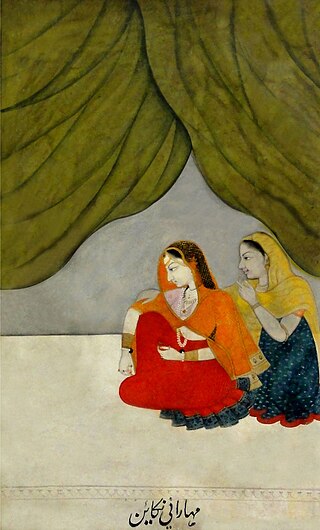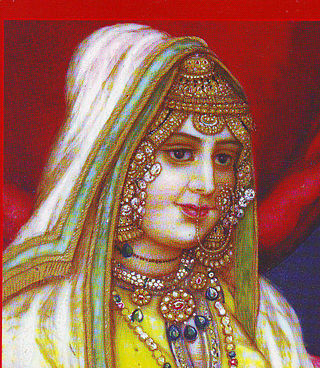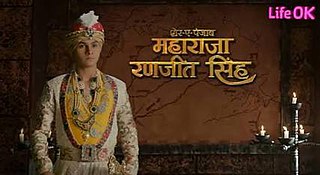Related Research Articles

Ranjit Singh was the founder and first maharaja of the Sikh Empire, ruling from 1801 until his death in 1839. He ruled the northwest Indian subcontinent in the early half of the 19th century. He survived smallpox in infancy but lost sight in his left eye. He fought his first battle alongside his father at age 10.

The Sukerchakia Misl was one of twelve Sikh misls in Punjab during the 18th century, concentrated in Gujranwala and Hafizabad districts in western Punjab and ruled from (1752–1801). The misl, or grouping with its own guerilla militia, was founded by Charat Singh of Sandhawalia, grandfather of Maharaja Ranjit Singh. The last Sukerchakia Misldar was Maharaja Ranjit Singh. Towards the end of the eighteenth century, Maharaja Ranjit Singh united all the misls and established an independent Sikh Empire.

Sher Singh was the fourth Maharaja of the Sikh Empire. Elder of the twins of Maharaja Ranjit Singh, founder of the Sikh Empire and Maharani Mehtab Kaur. His reign began on 18 January 1840 following his assault on Lahore which ended the brief regency of Maharani Chand Kaur. He was assassinated on 15 September 1843 by Ajit Singh Sandhawalia.

Raj Babbar is an Indian Hindi and Punjabi film actor and politician belonging to Indian National Congress. He is a three-time member of the Lok Sabha and a two-time member of the Rajya Sabha. He was the state President of Uttar Pradesh Congress Committee.

Maharani Jind Kaur was regent of the Sikh Empire from 1843 until 29 March 1847. After the Sikh Empire was dissolved on 29 March 1847 the Sikhs claimed her as the Maharani and successor of Maharaja Duleep Singh. However, on the same day the British took full control and refused to accept the claims.

Maha Singh, also spelt as Mahan or Mahn Singh, was the second chief of the Sukerchakia Misl, which as a Sikh grouping with its guerilla militia was one of twelve Sikh Misls that later became part of the Sikh Empire. He was the eldest son of Sardar Charat Singh and Sardarni Desan Kaur Warraich. He was the father of Sher-e-Punjab Maharaja Ranjit Singh.

Hari Singh Nalwa was the commander-in-chief of the Sikh Khalsa Fauj, the army of the Sikh Empire. He is known for his role in the conquests of Kasur, Sialkot, Attock, Multan, Kashmir, Peshawar and Jamrud. Hari Singh Nalwa was responsible for expanding the frontier of Sikh Empire to beyond the Indus River right up to the mouth of the Khyber Pass. At the time of his death, Jamrud constituted the western boundary of the Empire.

Maharani Datar Kaur (born Bibi Raj Kaur Nakai; was the queen consort of Maharaja Ranjit Singh, the founder of the Sikh Empire and the mother of his successor, Maharaja Kharak Singh. She was the daughter of Sardar Ran Singh Nakai, third ruler of the Nakai Misl and Sardarni Karmo Kaur.

Sardar Charat Singh, also romanised as Charhat Singh, was the founder of Sukerchakia Misl, father of Mahan Singh, and the grandfather of Ranjit Singh, the first Maharaja of the Sikh Empire. He distinguished himself at an early age in campaigns against Ahmad Shah Abdali and along with 150 horsemen split from the Singhpuria Misl to establish the Sukerchakia Misl, a separate grouping with its distinct guerilla militia.
Baherwal Kalan is a village in the Kasur District of Punjab, Pakistan. The neighboring villages are Bhonikey, Rore, Taragarh, Khudian, Chak 41, Jaguwala and Kot Het Ram. It is the birthplace of Maharani Datar Kaur, wife of Maharaja Ranjit Singh and the mother of his successor, Maharaja Kharak Singh.

Maharani Mehtab Kaur was the first wife of Maharaja Ranjit Singh, the founder of the Sikh Empire. She was the mother of Maharaja Sher Singh, who briefly became the ruler of the Sikh Empire from 1841 until his death in 1843.
Rani Raj Kaur was the wife of Maha Singh, the leader of the Sukerchakia Misl and the mother of Maharaja Ranjit Singh, the founder of the Sikh Empire. She was affectionately known as Mai Malwain after her marriage. She is also referred to as Sardarni Raj Kaur and Rajkumari Bibiji Raj Kaur Sahiba before marriage. She was the daughter of Raja Gajpat Singh of Jind.

Sher-e-Punjab: Maharaja Ranjit Singh is an Indian historical drama based on the life of Maharaja Ranjit Singh (1780 –1839), the founder of the Sikh Empire, which ruled the northwest Indian subcontinent in the early half of the 19th century. The series stars Damanpreet Singh, Tunisha Sharma, Shaleen Bhanot, Rumi Khan, Sonia Singh, Sneha Wagh and Chetan Pandit.
Sardarni Desan Kaur Waraich, also known as Mai Desan was the regent of the Sukerchakia Misl during the minority of her son from 1770. She was the wife of Sardar Charat Singh and the mother of Sardar Maha Singh. Her grandson, Maharaja Ranjit Singh, was the founder of the Sikh Empire.
Kunwar Rattan Singh (1805–1845) was the second son of Maharaja Ranjit Singh, the founder of the Sikh Empire and his queen consort, Maharani Datar Kaur His elder, Maharaja Kharak Singh was the second Maharaja of the Sikh Empire and nephew, Maharaja Nau Nihal Singh was the third Maharaja. The former reigned for less than four months, and the latter barely four weeks.
Sardar Ran Singh Nakai was the third chief of the Nakai Misl, which was one of the Sikh groupings and guerilla militia that later became part of the Sikh Empire. He was born to the Sandhu family of Jat Sikhs. He distinguished himself at an early age in campaigns with his father, Natha Singh Sandhu and uncle, the legendary Heera Singh Sandhu who was the founder of the Misl. Ran Singh was a fierce warrior and a powerful misldar; under his leadership the misl was at its highest. He was the father of Maharani Datar Kaur and the father-in-law of Maharaja Ranjit Singh, the founder of the Sikh Empire. He was the grandfather of Maharaja Kharak Singh, the second king of the Sikh Empire and Sardar Kahan Singh Nakai, the last chief of the Nakai Misl.
Sardar Kahan Singh Nakai was the sixth and last chief of the Nakai Misl. He was the grandson of the famous Sikh chief, Ran Singh Nakai and Sardarni Karmo Kaur. His aunt, Maharani Datar Kaur was one of the wives of Maharaja Ranjit Singh, founder of the Sikh Empire. From an early age he assisted his father in campaigns and even commanded campaigns assigned to him by his uncle, Maharaja Ranjit Singh. His cousin, Kharak Singh went on to become the second Maharaja of the Sikh Empire, though he ruled for barely four months. He was the uncle of the third Maharaja, Nau Nihal Singh.
Sardarni Karam Kaur popularly known as Karmo Kaur was the wife of Ran Singh Nakai, the third ruler of the Nakai Misl, one of the groupings with its distinct guerilla militia that later became part of the Sikh Empire. Karmo Kaur served as the regent of the Nakai Misl during the reign of her sons, Bhagwan Singh and Gyan Singh. She was the mother of Maharani Datar Kaur, one of the wives of Maharaja Ranjit Singh, the founder of the Sikh Empire. She was the grandmother of Maharaja Kharak Singh, the second king of the Sikh Empire and Sardar Kahan Singh Nakai, the last chief of the Nakai Misl.
References
- ↑ "Raj Babbar's serial on Maharaja Ranjit Singh to debut on tv". Zee News. 11 April 2010. Retrieved 6 June 2020.
- ↑ "Long live the King". Indian Express. 13 April 2010. Retrieved 6 June 2020.
- ↑ "Maharaja Ranjit Singh will remind people of history". OutlookIndia. 9 April 2010. Retrieved 6 June 2020.
- ↑ "Doordarshan's Mega Serial on Maharaja Ranjit Singh to go on air from April 13th". pibmumbai. 8 April 2010. Retrieved 6 June 2020.
- ↑ "Babbar's Rs 125 crore film on Ranjit Singh". News18. 12 April 2010. Retrieved 6 June 2020.
- ↑ "king size–Raj Babbar brings a story of glory and guts on small screen with his magnum opus, Maharaja Ranjit Singh". The Tribune. 12 April 2010. Retrieved 6 June 2020.
- 1 2 "Doctored to act". The Sunday Tribune. 7 May 2006. Retrieved 6 June 2020.